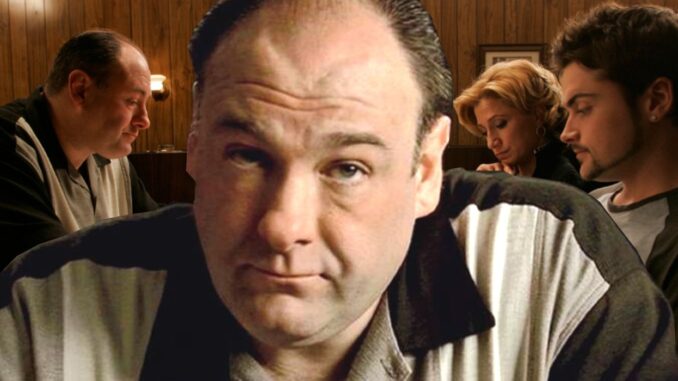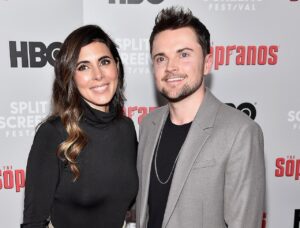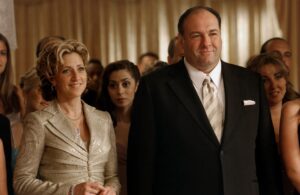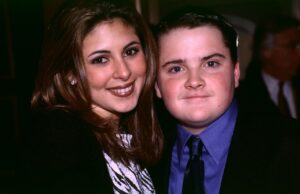
On the night of June 10, 2007, people across the country cursed their TVs.
Then the credits rolled.
The startling cut to black would define “Sopranos” discourse for the next 13 years. What happened — or didn’t happen — to Tony in Holsten’s that night? Were we supposed to know, and did it matter?
Fans scrutinized the final scenes like the Zapruder film, stacking up evidence to support their conclusions that the Mafia boss had either died or remained alive.
To mark the anniversary of the iconic series finale, we caught up with several “Sopranos” stars, including those who were there for the last chapter.
As people have been watching and rewatching the show in quarantine over the last three months (helped along by a period of free access from HBO), the actors have been revisiting “The Sopranos” in another medium fit for the pandemic — podcasts.
In March, Drea de Matteo, who played Adriana La Cerva, started a “Sopranos” rewatch podcast called “Made Women” with her friend Chris Kushner, who hails from Wayne. In April, co-stars Michael Imperioli and Steve Schirripa, who played Christopher Moltisanti and Bobby Baccalieri, debuted their own rewatch podcast, “Talking Sopranos.”
Jamie-Lynn Sigler, who played Tony’s daughter, Meadow Soprano, and Robert Iler, who played Meadow’s brother, A.J. (Anthony Soprano Jr.), co-host the “Pajama Pants” podcast with Kassem Gharaibeh.
We spoke to De Matteo, Kushner, Sigler and Iler about the cut to black, the power of the show, the upcoming prequel movie “The Many Saints of Newark” and why podcasting is a natural second act for the “Sopranos” cast.
The pandemic means a lot of people are rewatching “The Sopranos” (and for some, watching for the first time) — they’re also listening to podcasts. Both activities fall into your wheelhouse. What has rewatching the show been like for you, having been a part of it all? Have you learned anything or realized anything new since filming the show?
Drea de Matteo: Oh my God, yes. I grew up in the theater, so when I started reading those scripts, I was already on the whole beauty of the show. Like, I really understood it, even as young as I was. I had such a deep understanding of it because my mom’s a writer and being Italian American and knowing the whole subculture and the struggles and whatever of the Italian American community, I was so engaged with it at an early age. But I wasn’t a mom yet. I wasn’t a responsible adult in the world yet, so seeing it through that lens has definitely changed things.
When we originally set out to do a podcast, our premise that we were pitching to people was more about being busted and readjusted. That was our tagline. Our show really was born out of a sisterhood between myself and Chris (Kushner) where I was kind of in a sh*tty place last year and she was trying to help me kind of rise out of the ashes and recognize the world around me. We wanted to tackle something more psychological. And the people that we met with were like, “Listen, we’ll do that show that’s a great idea, but can we tackle a ‘Sopranos’ rewatch first?”
I at first was like, “No, I don’t want to revisit my past. I’m trying to create my future here.” You know, I think when we hit our 40s, we sort of really make decisions on where we want to be, where we’ve been, where we’re going, and if we want to stay on the path that we’re on — for example, do I want to continue acting? All kinds of things, especially being a parent, and the climate of Hollywood and how difficult it is for women in our industry to continue working at a certain age.
I started rewatching, was floored. And I thought to myself, “Wow, if I can’t tackle the emotional issues that we probably would’ve been discussing on a show about being broken down and rising up from it through the lens of ‘The Sopranos,’ then I really have nothing to say,” because that show goes so far into the psyche of all these characters and it tackled issues that television had never really tackled before. And to put it in a humorous capsule sort of — because the show was funny, man, it wasn’t just a drama, it had so much humor and so many layers of art and of life — I no longer wanted to do our other idea. I became extremely excited at the prospect of making it more of a relate than a rewatch. We’re tackling it from a little bit more of this heart-and-soul place.
Why did you want to do a podcast?
Jamie-Lynn Sigler: I started a podcast called “Mama Said,” which is kind of just about parenting and the ups and downs of it all, almost two years ago. Robert (Iler) and I are best friends. We talk all the time. We’re always just bouncing ideas off each other and confiding in each other. Rob was feeling like he was done with poker and wanting to transition to something else. When we talk, we just don’t stop talking. Rob introduced me to his friend Kassem who’s hilarious and funny and smart. We just felt like the three of us might make for a good conversation, so that’s how “Pajama Pants” was born.

We talk about (“The Sopranos”) all the time. Most of our guests have been “Sopranos” cast members. We’ve had Drea on, we released one today with Vince Curatola (who played Johnny Sack). We’ve had Aida (Turturro, who played Janice Soprano), we’ve had Michael (Imperioli), we’ve had Steve (Schirripa). It’s a huge part of our lives. They are our friends and our family. (The show’s) kind of had this resurgence since quarantine. A lot of people have revisited or watched it for the very first time, so I feel like people are looking us up to see where we’re all at.
Robert Iler: I spent 90 days, pretty much, in LA alone. Having the podcast was a nice thing. My favorite part is it’s a scheduled time, every week, me and Jamie know, hey we’re going to get to (talk). From what I remember, where it kind of came together was at the “Sopranos” 20-year anniversary and we were in New York. We were sitting in Jamie’s hotel room after the whole thing and it was just like, “Man, we really need to do something.” I was living in Vegas at the time and I was ready to get out of there. I was like, “Hey, if I move to LA, would you start a podcast with me?”
De Matteo: The topic of women in the show is not something even a man can even bypass, because women play such an important role. In a lot of Mafia-genre movies and stuff, the women are really just sort of there on the side. This show never approached women that way.
This show really showed you right off the bat, from the pilot, that the women are pulling a lot of strings. They’re like puppet masters. And we’ve never seen that before, so you really that either behind every man is a great woman or that behind every man is a f**king evil woman in terms of Livia Soprano who sort of mirrors Livia during the Roman Empire (Livia Drusilla, wife and adviser to the emperor Augustus), who was all-powerful behind her family, doing all kinds of nefarious things to get what she wants. Here we have Livia Soprano, who’s at the center of the show right off the start. And then you have Carmela (Soprano) who is a no-bullsh*t kind of broad. Just all the layers and struggles of women trying to stand their ground in a world like that.

My character is different from a lot of those characters. She’s different from Charmaine (Bucco), she’s different from Rosalie Aprile, she’s different from Carmela, she’s different from Janice (Soprano). These are all people who are really finding their individuality. While Adriana is also trying to do that, you see it from a totally different perspective, especially once David Chase really started to flesh my character out. In the beginning, she was never considered a series regular. He (Chase) would always latch on to people’s personalities and write for that. Not the big main characters, but for my character, I know he did. And I think he saw my vulnerability when I was young. I was tough, yet I was vulnerable and I think he saw through a lot of that.
You really take this journey with her (Adriana) through all those seasons where she tries to better herself early on, where she’s trying to find her arc, just like Christopher in the first season. Probably had she put all of her energy and love into herself and didn’t switch gears and put it all into him, she might’ve survived. She might’ve lived a different life, and that was a struggle that I had even as a young girl growing up in Queens in an Italian neighborhood. It was, “Is she gonna stay or is she gonna go (meaning me)?” I was torn between both worlds, because there was a safety in Queens and, you know, getting married young, raising children and knowing that this is what the status quo was, that that was OK. And then I was raised by a mom who refused to learn how to use a dishwasher, a stove, boil water.

But you see all these different characters on “The Sopranos” and I found myself in all of them in my own life as I started watching the show again now. (Dr.) Melfi is Tony Soprano’s puppet master. (“I’m going to stick with therapy because I’m getting good ideas in here.) Livia’s pulling the strings for Junior. Charmaine is pulling the strings for Artie Bucco. David Chase has respect for women.
My great-grandmother was somebody who was pulling all kinds of strings within the Mafia world. She had so much dirt on everyone from Washington to the streets of Harlem because of what she did for a living that was illegal. But she had secrets on everybody and this was a woman who was definitely pulling a lot of strings and making a lot of decisions that men didn’t want her to make but she had too much information on people. So these women did exist, it’s just those stories are not told.
Chris Kushner (co-host of the “Made Women” podcast): I feel like it’s so interesting to see these strong, sure-minded women. When women start pushing back in the show, you’re realizing the men can’t deal with it and they don’t know how to react and they’re cheating and maybe the women when they start pushing back they become less attractive and that’s when they have these other goomahs on the side. My mother is Italian and she was a stay-at-home mom. I chose a different lifestyle for myself, but I can still relate. Women can relate to that, this whole stereotypical notion of the men work and the women stay at home and they’re housewives and mothers and not having a life for themselves and kind of wanting to rise from the ashes and change that dynamic.
De Matteo: Normally when I walk down the street it’s the same thing every day. No one cares about the other shows I’ve been on, which were all pretty big shows. It’s still,“I couldn’t take when they killed you. I can’t believe they killed you.” The reactions were huge.
But you have so many different audiences with “The Sopranos,” which is why the show was so universal. It related to so many people for different reasons on so many different levels. You had your Mafia freaks that were really just watching it for that family, then you had people who wanted to watch a family show and loved the family dynamic within the Soprano home. Then you had people who were interested in the psychological aspect of it. Then you had people that were just interested in it simply for its artistic value and the literary aspect of it and how intelligently done it was.
With her death, I had a divide of fans who were (saying), “F**k her, she’s a rat. They got you, you should’ve never squealed.” But if people were really paying attention, she never gave up any information because she had none. Christopher never really told her anything.
When Big Pussy gets killed, compared to when Adriana gets killed, the struggle that Tony Soprano goes through trying to understand whether or not he’s a rat — because this is his best friend and how can I kill my best friend — compared to the minute Christopher tells Tony Soprano about what I told him, my confession about the FBI, there’s not even a moment taken to try to spare her life. It’s, “No, she’s f**king disposable, take her right out.” I think that was a really amazing choice on David Chase’s part because it does show the thoughtlessness and the brutality and symbolically when they kill off my character, you see that she’s a sacrifice. You really see now the downfall of your anti-hero Tony Soprano.
A lot of people were disgusted at that death. She was the innocence, symbolic of the love of mankind. When David Chase said we’re doing this, everybody was floored, upset. I was the only one that was like, “No, this is right for this series. This is what needs to happen.”
Sigler: I want to say it was about a week or two before. They had a screening for us at the HBO offices in New York City. I remember I was sitting next to Dominic Chianese. I remember Aida was there. It was a shock, at least for me. I don’t remember it written in the script that it was like a harsh cut to black or anything like that. So we all kind of turned around thinking the monitor went out or something, there was like a malfunction. So we kind of experienced that with everyone else.
I remember us all kind of shaking our heads, being like, “Man, David Chase can never be outdone.” He’s brilliant. That was perfect. I know it upset a lot of people but to me it was just, who would have thought of that? It was perfect.
For me, I interpreted it as, with all these potential threats to Tony and his life, he’s having this simple family moment. And this is the way these people had to live their lives all the time, in a state of denial. So it was almost like, this is inevitable, it’s probably going to happen. I don’t know if it happened that evening, but this was the life that this family chose.
De Matteo: I’m such a fan of this show and this writing, I have to watch it on Sundays with everyone else. I cannot know what’s going on. That Sunday, I had my normal “Sopranos” party just like every fan across America. Mozzarella, ziti, everything. I want to say I was pregnant but I’m not sure. I think I might have been pregnant (note: yes, she was).
I remember the TV going black. I remember being like, “F**k, I cannot believe that my TV just went out. I have a house full of guests. I start calling all my girlfriends that work on the show. “What’s going on, what happened? My TV just switched out, tell me what the final moment was.” I was all excited like I had the inside gossip for my friends that were in the house. They were like, “No, that’s the end,” and I was like “what!?” And it took me a minute. I stood there in the middle of my living room and I looked at everyone and they’re like, “This is bullsh*t!” And I said, “No, it’s not.” I said, “He just created the final water cooler talk of the series and it’s going to be the biggest one yet and people are still going to be talking about it till the end of f**king time.”
If they would’ve killed him, the fans would have been irate. If they would have let him live, the fans would have been irate. I said better to let everyone decide for themselves what they think happened. Then there’s also the whole existential theme throughout the show, how things just go to black. There’s an episode called “Nobody Knows Anything.”
Iler: “Sopranos” comes up in our podcast all the time because we talk about our lives and that was a big part of our lives. But I’ve never seen the season finale because I never watched the show.
Oh, really!

Iler: Yeah. When we used to do premieres, they would show us the first episode or the first two episodes and I saw that and probably a few episodes of the first season but besides that, I haven’t seen the show. Maybe once or twice I’ve gone back where I wanted to watch the first five minutes of every season because I just wanted to see.
For me, all the memories of “Sopranos” are right before we filmed every episode, everyone from the cast would show up and we would sit around a table — by the end it was 10 tables all put together — and we would eat lunch and everybody would read their lines. Somebody like Michael Imperioli, sometimes we would go three months without seeing each other because we wouldn’t be in a scene together. I was on a show with her for 10 years, I never had a scene with Lorraine Bracco. We would all get put in this room once every two weeks or so. Those were my favorite things. Everybody had this mutual respect for everybody. A lot of people would show up in pajama pants (podcast title shoutout!) and hoodies. There would be Italian cold cuts and sandwiches and soda. We would just sit around and laugh and have such a good time. We were always laughing. Tony Sirico (who played Paulie Walnuts) is just one of the funniest people.
Iler: Constantly. Or they do a thing where like, they’re the only ones who know what actually happened. They actually refuse to have conversations about it because they think they know and other people don’t know so they just get frustrated.
Do you still get a lot of people saying your line from the pilot, “So what, no f**king ziti now?”
Iler: The first couple seasons, the ziti line was the thing. But now and in the last 10 years, usually what people say when they see me is they don’t know where they know me from. I just kind of let it go because there was one time where I was in a rush going somewhere and somebody was like, “Where do I know you from?” And I was like, “Oh, Sopranos.” And they were like, “No …” and I was like, “Ohh,” and I felt stupid.
Sigler: Every time! Aaaaall the time. That’s the one zinger that people always say: “How’s your parallel parking? Did you learn how to parallel park?” As if for some reason my parallel parking was the reason for the ending. But it did add to the tension and that’s exactly, I think, what its purpose was.
De Matteo: I’m less excited about what the story’s about even though I’m dying to see it. But I am so excited to see Ray (Liotta) in the movie that that’s kind of all I care about. He wanted to be on “The Sopranos.” He would tease me all the time when we were doing “Shades of Blue,” like, “Why didn’t they ever f**king call me?!” And I was like, “Because you’re a huge star, buddy. You were Henry Hill.” So now he finally got to work with David and he’s one of my favorite actors. I’m just really excited to see him do his thing in our world.
Sigler: We’ve heard the stories throughout the history of “Sopranos,” but to see it and to see the history and all these characters come to life in David’s mind in his world, and to be directed by Alan Taylor, who was one of my most favorite directors on our show, and to see Michael Gandolfini (James Gandolfini’s son, who plays young Tony), it’s going to be probably incredibly surreal, but I just am so proud of him and can’t wait to see him shine. I just can’t wait to see what he does. I can’t wait to see Vera Farmiga and what she does with Livia. There was always so much about (Tony’s) upbringing with her. I can’t wait to watch it just as a fan. I think it’ll work in their favor that it had to be delayed because they probably gained a huge slew of “Sopranos” fans that will go to watch that movie.
Iler: I’m sure I won’t understand any of the references but I’ll definitely check out the movie. Anything David Chase does, I want to support him. Also, somebody who helped Jamie and my podcast in the beginning was a guy named Joey Diaz, who’s huge in the podcasting world and he’s in the “Sopranos” movie. I wanna see Michael Gandolfini. I can’t wait to see his acting, I’m sure he (hit) it out of the park.
